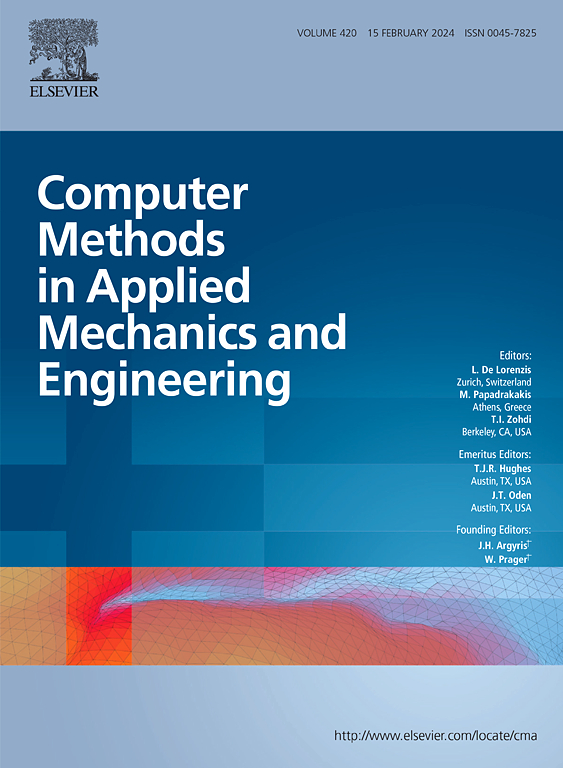无分解变分量子线性求解器:在计算力学中的应用
IF 7.3
1区 工程技术
Q1 ENGINEERING, MULTIDISCIPLINARY
Computer Methods in Applied Mechanics and Engineering
Pub Date : 2025-09-16
DOI:10.1016/j.cma.2025.118396
引用次数: 0
摘要
求解线性方程组是计算力学中的一项基本任务。最近提出的变分量子线性求解器(VQLS)通过使用量子计算为这一任务提供了潜在的加速。然而,它的应用面临着一个关键的瓶颈:将系数矩阵分解成一个酉矩阵的线性组合的成本要求。在这项工作中,我们提出了一种不需要分解的变分量子线性求解器(DF-VQLS),它消除了这一要求,使直接应用无需矩阵分解。关键创新在于提出了两种向量化技术,将VQLS的代价函数映射到向量的内积。具体来说,矢量化技术将矩阵重塑为一个向量,只需要对向量进行操作就可以计算成本函数,从而完全消除了矩阵分解。通过一个量子模拟器的算例验证了该方法的收敛性和准确性。在计算力学中的三个应用实例,包括杆、桁架和二维连续体问题,也显示了潜在的可行性。本文章由计算机程序翻译,如有差异,请以英文原文为准。
Decomposition-free variational quantum linear solver: Application in computational mechanics
Solving a linear system of equations is a fundamental task in computational mechanics. The recently proposed variational quantum linear solver (VQLS) offers potential acceleration for this task by using quantum computing. However, its application faces a critical bottleneck: the costly requirement to decompose the coefficient matrix into a linear combination of unitary matrices. In this work, we propose a decomposition-free variational quantum linear solver (DF-VQLS) that eliminates this requirement, enabling direct application without matrix decomposition. The key innovation lies in proposing two vectorization techniques, which map the cost functions of VQLS to the inner product of vectors. Specifically, the vectorization techniques reshape the matrix into a vector, and only manipulations on the vector are needed to compute the cost functions, thereby eliminating matrix decomposition entirely. The convergence and accuracy of the proposed method are validated through numerical examples on a quantum simulator. Three application examples in computational mechanics, including bar, truss, and two-dimensional continuum problems, are also presented to show the potential feasibility.
求助全文
通过发布文献求助,成功后即可免费获取论文全文。
去求助
来源期刊
CiteScore
12.70
自引率
15.30%
发文量
719
审稿时长
44 days
期刊介绍:
Computer Methods in Applied Mechanics and Engineering stands as a cornerstone in the realm of computational science and engineering. With a history spanning over five decades, the journal has been a key platform for disseminating papers on advanced mathematical modeling and numerical solutions. Interdisciplinary in nature, these contributions encompass mechanics, mathematics, computer science, and various scientific disciplines. The journal welcomes a broad range of computational methods addressing the simulation, analysis, and design of complex physical problems, making it a vital resource for researchers in the field.

 求助内容:
求助内容: 应助结果提醒方式:
应助结果提醒方式:


